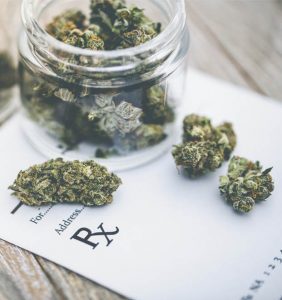 Depression is a common mental health disorder that affects millions of people worldwide. It can have a debilitating impact on one’s life, making even daily activities seem overwhelming with little enjoyment. Traditional treatments, such as therapy and antidepressant medications, work well for many individuals, but there are cases where these approaches may be ineffective or cause unpleasant side effects. In recent years, medical marijuana has gained attention as a potential alternative treatment for depression for those who are looking for an alternative approach to traditional pharmaceuticals. This article explores the relationship between medical marijuana and depression, discussing its potential benefits and considerations for its use.
Depression is a common mental health disorder that affects millions of people worldwide. It can have a debilitating impact on one’s life, making even daily activities seem overwhelming with little enjoyment. Traditional treatments, such as therapy and antidepressant medications, work well for many individuals, but there are cases where these approaches may be ineffective or cause unpleasant side effects. In recent years, medical marijuana has gained attention as a potential alternative treatment for depression for those who are looking for an alternative approach to traditional pharmaceuticals. This article explores the relationship between medical marijuana and depression, discussing its potential benefits and considerations for its use.
Understanding Depression
Depression is a complex mental health disorder characterized by persistent feelings of sadness, loss of interest or pleasure in activities, changes in appetite or sleep patterns, low energy, and a sense of worthlessness. It can significantly affect a person’s ability to function in daily life, impacting relationships, work, and overall well-being. Depression can be triggered by various factors, including biological, genetic, environmental, and psychological elements. According to the WHO, 3.8% of the population experience depression. Depression is more common in women and adults over 60 years old.
Medical Marijuana and its Components
Medical marijuana refers to the use of cannabis or cannabinoids for medical purposes. Cannabis contains more than 100 different compounds, known as cannabinoids, with the two most studied being tetrahydrocannabinol (THC) and cannabidiol (CBD). THC is psychoactive and responsible for the “high” associated with marijuana, while CBD is non-psychoactive and has potential therapeutic effects. CBC, CBG, and CBN have also been shown in studies to reduce symptoms of depression and anxiety.
Potential Benefits of Medical Marijuana for Depression
Mood Regulation:
Medical marijuana, particularly CBD, has shown promise in mood regulation. CBD interacts with the endocannabinoid system in the brain, which plays a role in mood regulation. Some studies suggest that CBD may help alleviate symptoms of depression by influencing serotonin receptors.
Stress Reduction:
Chronic stress often accompanies depression. Certain strains of medical marijuana, particularly those high in CBD, may help reduce stress levels and induce a sense of relaxation. This can be beneficial for individuals struggling with anxiety and depressive symptoms.
Appetite Stimulation:
Depression can lead to a loss of appetite and subsequent weight loss. Medical marijuana, especially strains high in THC, can stimulate appetite, potentially aiding individuals in regaining lost weight and improving overall nutrition.
Sleep Improvement:
Sleep is absolutely vital to one’s physical health and wellbeing. Insomnia and disrupted sleep patterns are common in individuals with depression. Certain strains of medical marijuana, particularly indica strains, may have sedative effects, helping individuals achieve better sleep and rest. This can include both falling asleep faster and staying asleep longer.
Pain Relief:
Chronic pain often coexists with depression. Medical marijuana, particularly strains with a balanced ratio of THC and CBD, can provide pain relief, enhancing the overall well-being of individuals struggling with both depression and chronic pain. Cannabinoids in medical cannabis also have strong anti-inflammatory properties that work particularly well for those whose pain may stem from inflammation, such as arthritis.
Considerations and Precautions
Consultation with a Medical Professional:
Before considering medical marijuana as a treatment for depression, it’s essential to consult a healthcare professional, especially one with expertise in medical marijuana. They can provide guidance based on an individual’s medical history, current medications, and specific circumstances.
Strain Selection:
The choice of marijuana strain is crucial. Strains high in CBD and low in THC are often recommended for individuals seeking therapeutic effects without the psychoactive “high” associated with THC. With 100’s of licensed dispensaries in Florida, there are countless strains and product lines that have been engineered for specific symptoms and condition.
Dosage and Administration:
Determining the appropriate dosage and method of administration is essential. Starting with a low dose and gradually increasing it under medical supervision can help manage potential side effects and achieve the desired therapeutic effect.
Awareness of Potential Side Effects:
Like any medication, medical marijuana can have side effects, including dry mouth, increased heart rate, impaired memory, and altered judgment. Being aware of these potential side effects is important for informed decision-making and working with a licensed marijuana practitioner will help you properly balance the benefits vs any undesirable effects.
Conclusion
Medical marijuana holds promise as an alternative treatment for depression, offering potential mood regulation, stress reduction, appetite stimulation, improved sleep, and pain relief. However, it’s crucial to consult with a medical professional and understand the appropriate strain, dosage, and administration methods. Further research and clinical trials are necessary to fully comprehend the efficacy of medical marijuana for depression, but its potential as a complementary or alternative treatment offers hope to those seeking relief from this debilitating condition.
COMPASSIONATE HEALTHCARE OF FLORIDA
www.flmmjhealth.com
Call for Appointments (833) 633-3665










